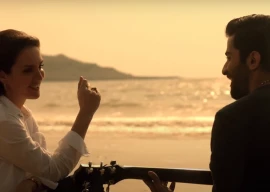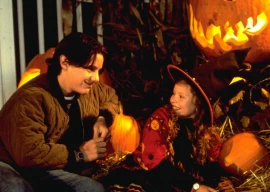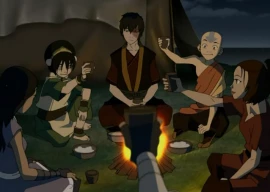
This film’s predecessor, East is East, came out in the pre-9/11 world of 1999 and was a huge success. Written by Ayub Khan-Din, who had a Pakistani father and an English mother, it was an autobiographical tale of the chaotic household of authoritarian father George (Jahangir) Khan (Om Puri), his wife Ella (Linda Bassett) and their six children each struggling in his/her own way to come to terms with their identity. Set in a working class area of Salford near Manchester in 1972, the film was often hilarious, at times dark, but always rang true.
The sequel, West is West has come 12 years later but is set five years on from the earlier film. All George and Ella’s children have left home except Sajid, the youngest child (who in East is East didn’t emerge from his hooded jacket until the film’s final scenes). Now 15, Sajid (Aqib Khan) is bullied at school and is on his way to becoming a juvenile delinquent. He resents his father and rejects the Pakistani identity George/Jahangir tries so crudely to force upon his children.
A trip to Pakistan, decides Jahangir, will cure his youngest of his ills. Father and son set off to the village in Punjab where Jahangir himself is returning for the first time since he set off for England. Sajid’s older brother Maneer (the religious one) is already there unsuccessfully trying to find a wife.
As the pair land in 1976 Pakistan we realise that it is not just the sullen and resentful Sajid who has issues to resolve. Jahangir must face the wife and children he left behind and in doing so come to terms with himself. Guilt drives Jahangir to withdraw all his savings and build a new house for the family in Pakistan. As one month’s holiday turns into several months, a worried Ella, with best friend in tow, arrives in the village to find out why Jahangir and Sajid haven’t returned to Salford.
The film is genuinely amusing in places and there is the occasional chuckle moment, but at other times the jokes are a little tired and predictable (the incongruity of the English women in the village, the toilet roll in the fields, and so on). Some members of the mostly British Pakistani audience were in fits of laughter throughout, but the laughs were mostly of recognition (a Punjabi swear word! funny!).
There has been some criticism in the English press of the lack of acknowledgement in the film of the troubles facing Pakistan today. This is unjustified as the film is set in 1976, and the Punjabi village portrayed is one that is still comfortable with itself and has not been poisoned by the religious intolerance and Dubai money petty-mindedness of later years.
Although one appreciates the attempt to portray a Pakistan that doesn’t fit the current western stereotype, the portrayal does occasionally stray into the realms of cliché. There is the twinkly- eyed wise Sufi pir who (remarkably fluent in English) leads Sajid subtly to an understanding of himself, and the sudden appearance of sufi dancers during an otherwise evocative shrine scene.
But one can over emphasise the few irritants that are scattered through this otherwise warm and humane film. Sajid comes to see the value in his Pakistani heritage and can now more comfortably reconcile it with his British identity. Maneer with Sajid’s help finds the ideal wife, not the good village woman he had come to find but another working class northerner like himself. Jahangir, usually at home on the moral high ground, has to accept the grief and pain he caused his abandoned family and acknowledge the sacrifices Ella has made for him.
Ayub Khan Din is of a generation where the two cultures clashing in his life were those of Pakistan and England. For a new generation another factor has been added to the mix, and that is Islam. This film does not address this latest crisis of identity and we may have to wait a bit longer to watch it being played out on our screens. But West is West is nevertheless a poignant, charming and well acted film that speaks of the need to acknowledge our past and our identities in order to move forward.
Published in The Express Tribune, Sunday Magazine, March 13th, 2011.







1730355716-0/Copy-of-Untitled-(59)1730355716-0-270x192.webp)
1730276684-0/Copy-of-Untitled-(55)1730276684-0-270x192.webp)
1730095495-1/WhatsApp-Image-2024-10-28-at-11-04-18-(1)1730095495-1-270x192.webp)







COMMENTS
Comments are moderated and generally will be posted if they are on-topic and not abusive.
For more information, please see our Comments FAQ